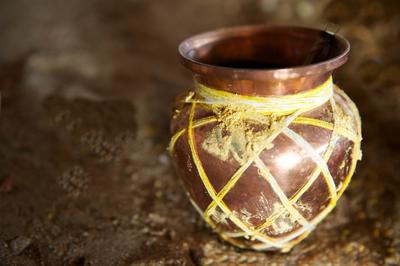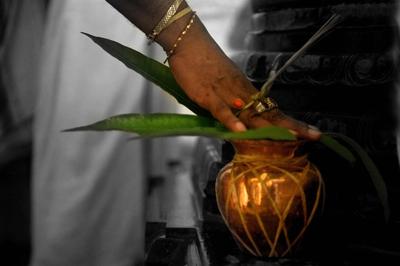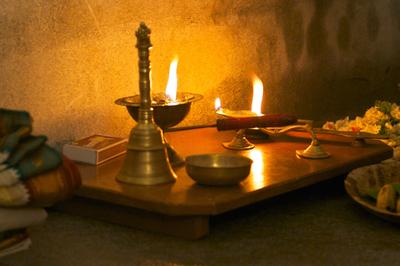
Custom Search
Ceremonial matters
by Pushpa Raghuram
(Bangalore, Karnataka, India)

Time: Mid 20th century. Janaki was born and brought up in a Hindu-Brahmin community.
She had observed, as she grew up, that a certain ritual was performed year after year in the name of one or the other deceased family member. Her parents told her that it is a religious event called “annual ceremony” (A.C. in short).
She attended A.Cs almost every month in her orthodox grand mother’s house – home to a large joint family. The priests, who helped perform the A.Cs, were not only old, but also grim. The atmosphere on such days appeared tense and grief stricken, since the banter and movement of youngsters in the area of action were banned. Except those performing the ceremony, the priests considered the other family members ‘untouchables’, until the men folk finished their meal, which was unfortunately never before 3 or 4 p.m.
She was told that it was the moral duty of sons to perform A.Cs for parents, who had passed on. The explanation did not satisfy her teenage curiosity. In fact, the question turned to a puzzle. Why should one who is ‘alive and kicking’ do such a thing for another who had ‘kicked the bucket’?
Her English teacher’s tip came to her mind. To comprehend any new concept, one had to contemplate on the 5 Ws and 1 H.¬ While watching the A.Cs in her own and her grand mother’s house, she got busy doing just that. When she turned seventeen she was almost ready to give a PPT presentation about it.
1. Who?
These A.Cs were gender biased and first son centric. By default the first son had to perform A.Cs for his departed parents. If he had younger brothers, they also participated in the program. Authorized priests came on request on the day of the A.C., to walk the son/sons through the rituals. The daughter–in-law was expected to be behind the scenes, but within earshot.
The daughters were exonerated from such duties. Janaki strongly felt, that it was unfair to disallow the fair sex to perform the rites and A.C.s for the parents. She pondered, as to what would happen to parents, who had only female progeny and no males.
2. What of food and clothing?
The number of items to be cooked and the order in which they had to be served were supervised by a senior member of the family with alacrity. That depended on the marital status of the departed soul, at the time of exiting the world. There were preferred/taboo vegetables for the day. Dietary restrictions were mandatory for the performer and his better half, on the day of the ceremony and the evening before.
The priest painstakingly instructed the ‘karthru’ (the performer), who should wash the 9 yards dhotis and saris for the occasion, when, where and how they were to be dried. He never forgot to add, that these were not to be touched by other members of the family while gallivanting in the house before the A.C.
3. When?
The A.C. was performed every year on the day the person died, as per the reigning star, according to the Indian Almanac. The A.Cs always commenced post noon.
4. Why?
The ‘karthru’ was driven by blind faith or fraught with fear.
The blind faith was that, on this day the performer would connect with the dead person, who would appear in the form of a crow or a cow to partake the food offered by him. Until the crow pecked or a cow sniffed the rice ball offered, the A.C. was not considered fruitful.
Another archaic faith ‘You reap what you sow’. Duties performed well in the present life were like investments in long term recurring deposits, which would yield accumulated dividends in their next birth. Janaki’s rational mind accepted this natural and economic law.
The belief was that if the son did not perform the A.C, his parents or forefathers would starve. The indomitable fear was that the son then would become a sinner.
Another unspoken fear of the son was, that he would not get the much sought after salvation (moksha), if he did not observe these rituals and would get trapped in a constant cycle of birth and re-birth.
Janaki’s concern: Should faithful daughters who did not have brothers, then fear that their parents would go hungry year after year. They were not allowed to feed the parents. And could they never aspire for salvation? Janaki had food for thought.
5. Where?
At home, irrespective of the size of the house.
6. How?
This depended on the diktat of the priest, who came to the family on request.
That was in Janaki’s teens. She had now stepped in to her twenties. She completed her education and became culturally and traditionally more and more aware of various inter religious practices in her home and outside. Thanks to her globetrotting paternal cousins for introducing her to different perspectives.
As per divine design she became part of the forward-looking Brahmin family of Ram and became Janaki Ram. She got a new address. The movers and packers helped her shift her luggage in no time. That was no big deal.
But she had to don a new role. She had to go from being a darling daughter to a discerning daughter–in-law. To do that effectively she had to shed her baggage. Leo-Packers could not help her with that.
She had to accede slowly but surely to a paradigm shift. The shift redefined the W’s and H of the A.Cs too. In Ram’s family they were as follows.
1. Who performed?
The same ancient rule was followed. It was the first son again.
2. What of food and clothing?
In Ram’s family, unlike in hers, the favorite dishes of the person, whose A.C. was being performed, were prepared on the day of the ceremony. The menu was decided keeping health in mind, and not religious restrictions.
A set of clothing was set-aside for this day and was called ‘the uniform’. That surely sufficed. Other rules about washing and drying were bent effortlessly.
3. When?
The A.C was, as per the star reigning on the time and day of demise, as per the Indian almanac, but not necessarily after mid-day.
4 Why?
The A.Cs were performed more to reminisce about the departed parents, their good words and deeds, to pay homage to their strengths and share a joke about their weaknesses. There were discussions about the flexi-bonds parents and children had shared. Fear or faith factors drove them probably only at a sub-conscious level.
Luckily there existed no cutting edge technology to weigh the loyalty quotient in relationships between the loving/living sons and the dead and gone parents. Parents anyways had immense faith in the loyalty of their sons.
5. Where?
In sync with the times, the venue had to be frequently changed by Janaki and Ram.
Due to the paucity of professional priests, Ram turned to the local ‘Mata’. The priests there offered ‘ceremonial’ services to devotees to ensure a regular additional source of income for themselves. Though A.Cs were performed individually to the departed soul, lunch was served in a common hall and at times people of various families shared the same floor. Birds of the same feather flocked together, exchanged views on various issues, got up-dates and made matrimonial alliances. Invariably there was gossip about those who were conspicuously absent. Religious centers became centers of gossip during such luncheons.
After a couple of such happenings, the unhappy Janaki sought small-scale entrepreneurs who offered to perform these A.Cs. They also prepared a special lunch for their customers for a hefty payment. They had a booming business. Computer savvy entrepreneurs had developed apps in their Macs to remind their customers and their family members about forthcoming A.Cs, to spare them the effort of remembering such mundane activities during the year. After getting their approval on-line they made necessary arrangements for the A.Cs.
Ram was unhappy after a while about such an A.M.C with entrepreneurs, since the A.C. (Shraaddha) was being organized without any involvement and interest (shraddha). They were run more like programmed events. Ram did not appreciate the principles of such entrepreneurs. He started performing the A.Cs at home again.
As far as the venue of the ceremonies was concerned, Janaki experienced a 360-degree turn. She was back to square one.
6. How?
A technician turned priest visited Ram on the day of the ceremony. He symbolically went through the condensed versions of the Mantras (ceremonial shlokas) with Ram, in front of a photo of his parent. Ram sat in a meditating posture and uttered the shlokas, thought intensely about his parents, and paid his homage to them. He felt a direct connection between himself and his parents. He soon began to believe that he did not need a mediator to facilitate the same.
***
After one such ceremony, Janaki was pensive for a long time.
She thought of the change in attitude towards the A.Cs that she had observed – in her grandmother’s place, at her parent’s and now at her husband’s house. Again the W’s bothered her.
Who or what was responsible for such black, white, grey areas, and myriad hues in rituals and traditions? Was it family values? Was it society? Was it religious institutions? Was it the commercial attitude of entrepreneurs in this competitive business world?
The grandfather’s clock struck seven. Janaki got the answer to her question! Yes, that was it! Time was the culprit. From time to time, attitudes towards A.Cs changed and were given as much importance as time permitted.
She heard some kids going home, chattering about sports. These next gen kids already had a mind of their own. In good time, they would deal with traditions and rituals in their lives. How would they define these five Ws and one H? She was unable to imagine how fear or faith would guide the actions of these kids.
She surrendered and said ‘Time will tell’.
Comments for Ceremonial matters
|
||
|
||
|
||
|
||
|
||
|
||
|
||
|
||
|
||















